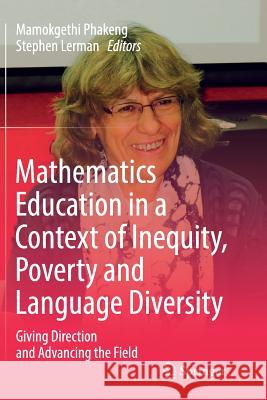Mathematics Education in a Context of Inequity, Poverty and Language Diversity: Giving Direction and Advancing the Field » książka
topmenu
Mathematics Education in a Context of Inequity, Poverty and Language Diversity: Giving Direction and Advancing the Field
ISBN-13: 9783319817569 / Angielski / Miękka / 2018 / 164 str.
Mathematics Education in a Context of Inequity, Poverty and Language Diversity: Giving Direction and Advancing the Field
ISBN-13: 9783319817569 / Angielski / Miękka / 2018 / 164 str.
cena 402,53
(netto: 383,36 VAT: 5%)
Najniższa cena z 30 dni: 385,52
(netto: 383,36 VAT: 5%)
Najniższa cena z 30 dni: 385,52
Termin realizacji zamówienia:
ok. 22 dni roboczych
Dostawa w 2026 r.
ok. 22 dni roboczych
Dostawa w 2026 r.
Darmowa dostawa!
Kategorie:
Wydawca:
Springer
Język:
Angielski
ISBN-13:
9783319817569
Rok wydania:
2018
Wydanie:
Softcover Repri
Ilość stron:
164
Waga:
0.26 kg
Wymiary:
23.39 x 15.6 x 0.97
Oprawa:
Miękka
Wolumenów:
01
Dodatkowe informacje:
Wydanie ilustrowane











